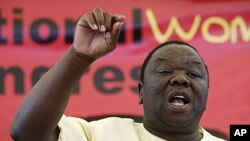For the first time mediators have reported progress toward agreement on a multi-party plan for elections in Zimbabwe. South African mediator Lindiwe Zulu said she hopes the Southern African Development Community will endorse this progress.
Ambassador Lindiwe Zulu, who is also South African President Jacob Zuma’s international advisor, said the Southern African Development Community recognizes all is not well in Zimbabwe.
“What is happening in Zimbabwe should not be happening," she said. "It is ourselves as Africans who have recognized the fact that what is happening should not be happening.”
The SADC recently condemned political violence in Zimbabwe that most observers blame on President Robert Mugabe's ZANU-PF party. The rare SADC criticism provoked a strong rebuke from Mugabe, who said Zimbabwe would not accept any interference from abroad.
But Zulu said there have been robust negotiations between ZANU-PF, the Movement for Democratic Change party led by Prime Minister Morgan Tsvangirai, and the small MDC party led by Welshman Ncube, on outstanding issues from the political agreement that is the foundation for the 26-month-old unity government.
Zulu said these negotiations have produced a "road map" toward free and fair elections.
She said some outstanding issues remain between the three political parties but that South African mediators will try to resolve them Tuesday in Harare.
Independent observers say the most difficult issues concern the mostly pro-ZANU-PF security forces and details in election laws. In addition, negotiators are concerned about the succession law should Mugabe die or retire before adoption of a new constitution.
Zulu said the Zimbabwe plan would be put to the region’s leaders at a May 20 SADC summit. She said the proposed plan would call for SADC personnel to assist Zimbabwe's monitoring and implementation committee.
Zulu spoke in Johannesburg to media and diplomats from African and Western countries. She asked the world to respect decisions made by Africans to try to resolve the Zimbabwe crisis.
“All the decisions that were taken by SADC to assist the process need to be respected," said Zulu. "The issue of the respect of human rights, the issue development, the issue of holding free and fair elections - we are not being taught by anybody else, it is something that we ourselves believe in.”
She said lifting Western travel and financial sanctions against the ZANU-PF leadership and several mostly state-owned companies is also a priority of Zimbabwe's political agreement.
"As a matter of principal the three parties have agreed sanctions must go, SADC has agreed the sanctions must go," she said. "But also at the same time there must be understanding, which we understand, the slower the pace goes, the more it becomes difficult to sell this idea.”
Zulu said the mediators recently travelled to Europe to discuss the sanctions that were imposed following violent and disputed elections in 2002. She said she saw some progress from the European Union and the United States on the sanctions issue.
“The word we came back with from almost all was, 'We are not inflexible to the discussion about the lifting of sanctions.' What does that mean? They are not saying, 'We shall not lift sanctions.' They are now saying, 'Let us talk,” added Zulu.
Zulu said there will not be elections in Zimbabwe this year because there is not time to fully implement the political agreement to ensure the next polls are free and fair.
Southern Africa Mediators Report Progress in Zimbabwe Political Talks









